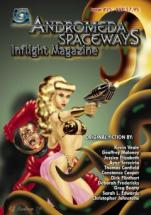“Nomenculture” by Ayne Terceira
“Mutant” by Thomas Canfield
“The Red Priest’s Vigil” by Dirk Flinthart
“Bonewood Forest” by Deby Fredericks
“But Momma Said” by Greg Beatty
“In Walked a Goblin” by Sarah L. Edwards
“The Old Oxford Charm” by Christopher Johnstone
What if you could teleport all of your unwanted food to those starving children in Africa? Better still, what if you received indescribably yummy Mana Bars in return for your contributions? This is the premise of Geoffrey Maloney’s “The Mana Bar Kid.” The idea is cute, but Maloney uses a lot of words to go nowhere in not much of a hurry, never answers the questions his plot raises, and has little to say to the reader beyond a few well-worn observations about addiction.
“Knight Wanted” by Jessica Elizabeth is a wryly humorous short short story featuring a job interview between King Barnaby and Sir—well, that would be telling. Suffice to say that sometimes, the finest credentials aren’t enough to snag that cherry job.
Employment problems also plague Danny Badweather, protagonist of Ayne Terceira’s “Nomenculture.” In Badweather’s world, people buy into racial patents to make themselves more appealing to companies seeking greater ethnic diversity among their employees. You, too, can be Inuit, or Japanese, or even Jewish (although “the Jews expect you to actually be Jewish”—a nice touch). As a Native American, Badweather has a genetic claim to a desirable ethnic group; unfortunately, he would have to buy into his tribe’s patent to claim it. His deceased mother’s objections (never explained) bar him and his little brother, Seth, from taking advantage of this obvious solution. Instead, Danny decides to patent his own unique ethnic group, and that’s when this story really takes off.
Some story ideas seem to be little more than a collection of words, while others suggest a world with a past, present, and future. “Nomenculture” has that kind of depth. It’s not so much about society’s sometimes ridiculous attitudes towards race as it is about an individual’s search for identity, and the desire to carve out one’s own unique turf. Terceira’s story intrigued me, and although the ending felt conclusive, I wanted more.
Two scientists from the Center for Disease Control show up one day to inspect Shuhi’s house for dangerous microorganisms in Thomas Canfield’s fun short story, “Mutant.” The tale finds humor in the different ways scientists and the lay public see the natural world. One man’s cute is another man’s vile. Canfield makes this point with style, finishing with an amusing and understandable—although regrettable—act of defiance by Shuhi.
In Dirk Flinthart’s “The Red Priest’s Vigil,” Teobaldo Marotti, an operative of the Inquisition, writes to his master regarding his efforts to trap the apostate Red Priest, Tomasso Dellaforte. To lure Dellaforte, Marotti wins the confidence of Dellaforte’s friend, Dominic de Mortibus, and then proceeds to slowly poison de Mortibus (and eventually murder) him.
“The Red Priest’s Vigil” is a tale of shifting loyalties, of the discovery of good in evil, evil in good. Flinthart’s creates a convincing setting, and his characters are fully realized. Better still, as with Terceira’s “Nomenculture,” Flinthart’s writing suggests a world much larger than the confines of this short story.
The arrival of Rowan Makefire upsets Hazel Farseer’s household in Deby Fredericks’s “Bonewood Forest.” To get to Hazel’s house, Rowan, daughter of Hazel’s good friend, Willow Silverweave, has to cross the Bonewood Forest. Hazel and Rowan both dread the forest, although Rowan has more cause: the forest has murdered everyone she knew and loved.
“Bonewood Forest” works well as a mystery, since the reader wants to know the answer to several questions: how does the forest work its evil? Why is Rowan such a wreck? And what is Rowan waiting for? Fredericks delivers on the mystery, but she has another goal, too. She’s cobbling together a different sort of fable. As with ancient fables, the forest is a dangerous place, but in Fredericks’s world, women—witches, in particular—provide security, not men.
Although her writing gets her off to a rough start (with the trite “her broad face weathered with cares” marring the first paragraph, and characters’ names chosen for their symbolic value), ultimately Fredericks crafts a successful and unique fable.
Short short “But Momma Said” by Greg Beatty is a good deal less successful. Why doesn’t Heather want to play with Jenny, even though her mother has encouraged her to play with outcast children? The punchline is stale and predictable. Although it takes only a bit longer to read than your average fortune cookie, pass on this one.
Sarah L. Edwards’s “In Walked a Goblin” is a fast-paced story about Sasha, a teenaged girl torn between wanderlust and family ties. The protagonist lives on a distant moon colony, Jocono, where she works at a restaurant, lives with her parents, and dreams of the stars. Edwards captures the blinkered vision of youth as she describes Sasha’s efforts to ship out, hopefully on an interstellar flight. But it’s Sasha’s growing friendship with the Goblin, Sir, which really drives this story. Their relationship echoes the story’s interest in the emotional bonds which hold us together, and the story’s believable conclusion further underscores this theme. Well done!
This issue of Andromeda Spaceways Inflight Magazine concludes with Christopher Johnstone’s “The Old Oxford Charm,”wherein an evening traveler relies on her schooling to outwit a hungry troll. It’s a brief story and not very long on logic, but the humor of the ending makes it a winner.
